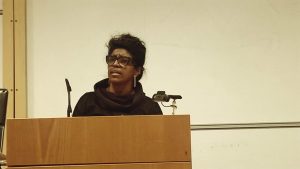In this year’s CeCIL Annual Lecture Professor Vasuki Nesiah (New York University) delivered a fascinating talk entitled ‘Reparations: The Jagged Time of Catastrophe’ that perfectly encapsulated this year’s theme of ‘vulnerability and resistance.’ In this lecture Vasuki explored the possible link between reparations in two different, and typically divergent, capacities. On the one hand, there are questions of reparations for historical injustices including slavery and colonialism. On the other hand, there is the understanding of reparations as they exist within the international human rights regime. In locating a site that demonstrates such a link, Vasuki turns our attention to the violent British suppression of the Mau Mau uprising in 1950s/60s colonial Kenya and the recent litigation of these events brought in the UK court system. Here it was shown how allowing the claims of the Mau Mau survivors to proceed required a tremendous degree of legal innovation to link the actions of formally abolished colonial authorities and the discretion of the currently existing British state.
In making this link, Vasuki highlighted the phenomenon of ‘joint criminal enterprise’ whereby the actions and responsibilities of the colonial government and the current UK government are connected not by the existence of a continuance legal system, but by a common purpose. For Vasuki, this ability to link parallel timelines has vast critical potential in expanding the scope of what should be appropriately considered when thinking about reparations as a legal right. Such a method offers a alternative to the dominant view of transitional justice as the singular and conclusive settling of accounts in a linear capacity. This talk was followed by an in-depth discussion and it is safe to conclude that those of us within the Kent Law School community who work on issues of structural violence, historical injustice, and claims for redress have found much enduring inspiration in hearing about Vasuki’s cutting edge-work.
The conversation on vulnerability and resistance in international law continued into the next day with the CeCIL annual workshop where Kent students were showcased their work. Here many fascinating presentations were given on a broad array of subjects from an equally broad array of perspectives and methodology. Amongst the topics discussed were international legal personality, arms control, the expanding role of NGOs, cyber warfare, the relationship between cultural heritage and international criminal law, the liability of the Assad regime for war crimes, and much, much more. Additionally, the workshop was greatly enriched by students from the Brussels School of International Studies. This allowed for a excellent interaction between the members of Kent’s various campuses. Furthermore, all student presentations prompted interesting conversations and our honoured visitor Vasuki was extraordinarily generous in providing feedback. While we look forward to many excellent CeCIL years to come, this year will be a particular difficult act to follow.
Eric Loefflad

